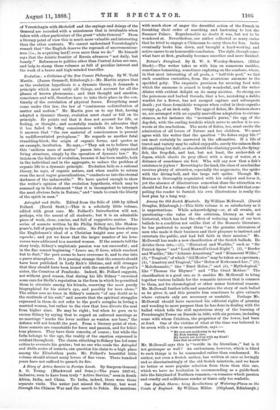as the evolution hypothesis is a dynamic theory, it demands
a principle which must unify all things, and account for all the phases of known phenomena ; and that thought and emotion, conscience and will, therefore have to take their place in the con- tinuity of the correlation of physical forces. Everything must come under this law, the law of "continuous redistribution of matter and motion." Mr. Martin goes on to say that, having adopted a dynamic theory, evolution must stand or fall on its principle. He points out that it does not account for life, or feeling, or thought ; and scornfully reminds its advocates that it has failed to lartitg consciousness within its law, though it answers that "the raw material of consciousness is present in undifferentiated protoplasm." He regards as another fatal stumbling-block, the origin of organic forms, and quotes as an example, incubation. He says,—" They ask us to believe that this ' uniform mass of matter' passes into a highly organised living structure, simply by the operation of dynamic law." He insists on the failure of evolution, because it has been unable, both in the individual and in the aggregate, to reduce the problem of organic life to a dynamic principle. Evolution fails as a rational theory, he says, of organic nature, and when unable to return even the most vague generalisations, " conducts us into the eternal darkness of the unknowable." We have quoted enough to show the writer's opinion of the evolution hypothesis, which may be summed up in his statement "that it is incompetent to interpret the most obvious facts in Nature," and "tends to crush the liberty of the spirit in man."


































 Previous page
Previous page